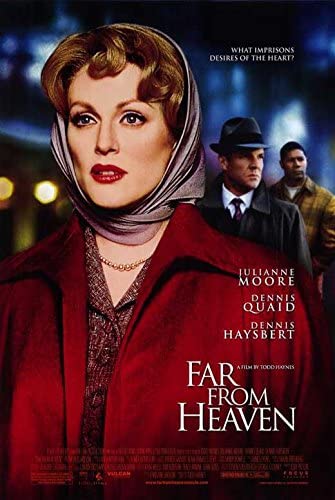Far From Heaven was released by on January 10, 2003
Director: Todd Haynes
Far From Heaven Cast: Julianne Moore, Dennis Quaid, Dennis Haysbert, Patricia Clarkson, Viola Davis
I know what you’re thinking. You’re thinking, what was he thinking when he threw this lurid melodrama, filmed in New Jersey, in 2001, in with all these genuine, 60s era California classics. Well, I was thinking that some of you might appreciate the stunning re-creation of mid 1950s, upper middle-class, suburban life this stunning film presents. Though it certainly has more going for it than esthetics, to me, much of the appeal of this film involves its look and feel, which was lifted right out of mid-century Hollywood.
In a homage to director Douglas Sirk, who created some of the most colorfully over-the-top, melodramas of the 1950s (All That Heaven Allows, There’s Always Tomorrow, Imitation of Life) writer-director Todd Haynes presents his own take on the old genre in which he out-Sirks Sirk himself. That’s not to say Far From Heaven is a perfect film, it’s not. Some of the performances go a bit wobbly at times, and the politically correct plot, which deals with a couple of the most popular “isums and phobias” of our day, is highly improbable, at least as a two-fer. But that’s not important, because the drama is presented and performed so endearingly, that the logistics don’t matter. I don’t care what’s going’ on at the Whitakers, I want to move in next door and have daiquiris with the girls! But as engaging as the theatrics are, they’re almost upstaged by the sumptuous backdrop Mr. Hayes and company have created on a minuscule budget (by Hollywood standards).

The fictionalized location for the story is Hartford Connecticut, in 1957, and it’s a stunning sight to see. The film was shot using 50s era equipment and production techniques, and everything put before the camera, even the wrong side of town, comes off as remarkably appealing—it’s a visual tour-de-force. The period correct costumes, the interiors, and the exteriors are made extraordinarily attractive. They even had the fall season performing on que. And as much as it’s a treat for the eye, it’s just as much a treat for the ear thanks to old-school soundtrack master, Elmer Bernstein, who provides the magnificent score.
For such a small film to outshine the very best that 1950s Hollywood could offer, is a truly miraculous achievement and deserves our attention, if for no other reason, than the utterly beguiling picture it paints of life in mid-twentieth century America. Praise be to the production team. Now the only thing I would like to know, after having witnessed this film on more than one occasion, is what ever happened to Kathy Whitaker? What about it Mr. Haynes?
